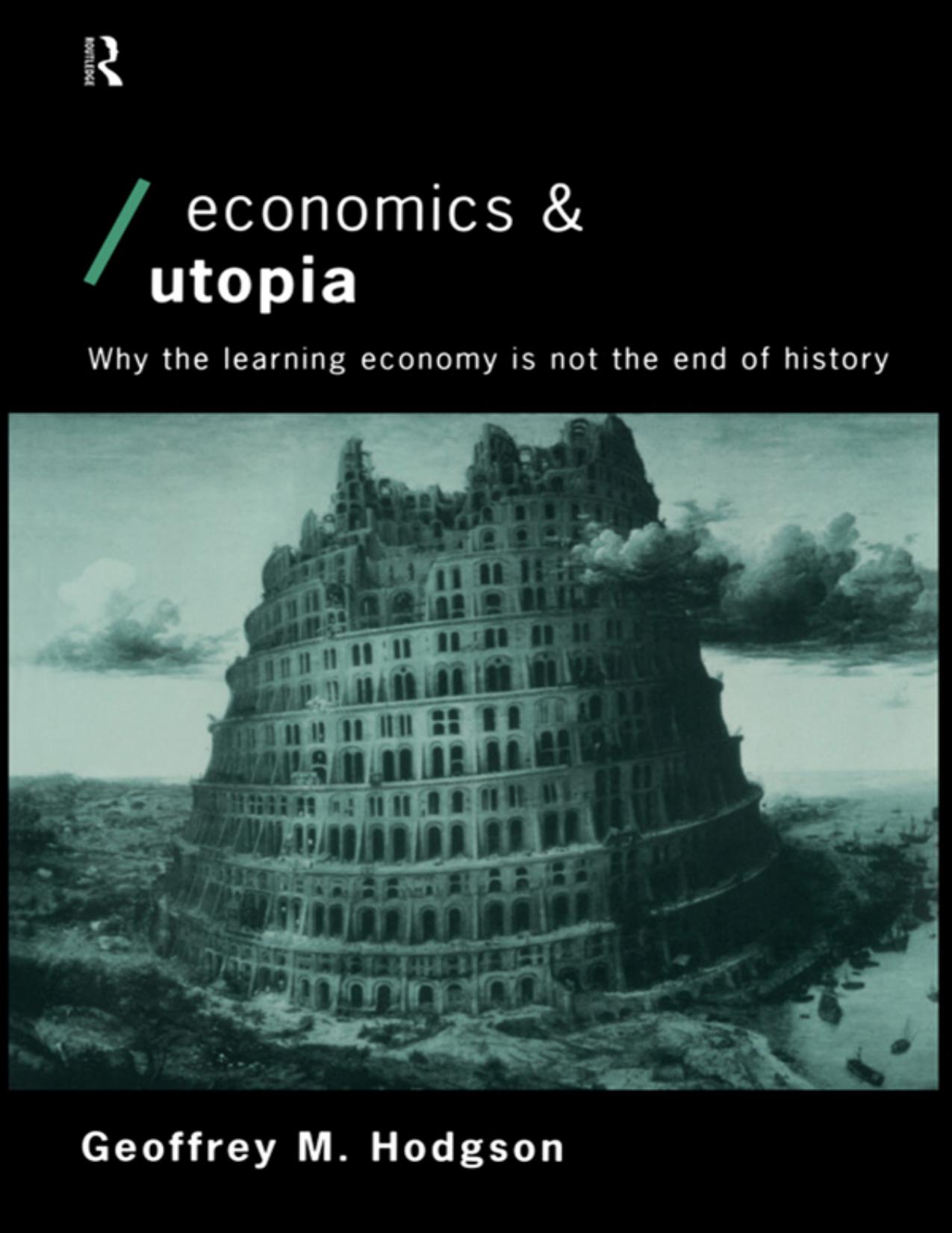Economics and Utopia by Geoffrey M Hodgson

Author:Geoffrey M Hodgson
Language: eng
Format: epub, pdf
Tags: ebook
Publisher: Taylor and Francis
Published: 2011-09-04T16:00:00+00:00
The juridical relation, whose form is the contract, whether as part of a developed legal system or not, is a relation between two wills which mirrors the economic relation. The content of this juridical relation (or relation of two wills) is itself determined by the economic relation.
Accordingly, the legal form of the contract gives us clues about the underlying economic relation, even if the mirror to which Marx alludes is always in fact a distorting one.
We all tend to take the existence of the capitalist system for granted. Hence it is important to realise the possibility of modern socio-economic systems that are neither capitalist nor socialist, even if some of these systems may still resemble capitalism in many respects. Assume that the workers are self-employed but do not own all the means of production. In this case there still may be powerful owners of factories, offices and machines. Even in a competitive equilibrium the owners of the means of production would still receive an income, emanating from that ownership. In bargaining with these owners, the workers would be required to concede the claim of these owners to an income, as they would be unable to produce without making use of the means of production owned by others. Hence the workers would still be deprived of what Marx described as âsurplus valueâ. Profits would still derive from ownership of the means of production. The differences with capitalism would be less to do with questions of income distribution, and more to do with matters of control over the work process.11
Hence we retain the employment relationship as central to the definition of capitalism, and maintain the important distinction between employment and self-employment. This conceptual demarcation is important not only in Marxian economics. For example, the famous discussion of âthe nature of the firmâ by Ronald Coase (1937) relied importantly on what could be described as a âthought experimentâ involving, in part, a variety of self-employment. He compared two (real or hypothetical) ways in which production could be organised:
To organise production like a âmarketâ, with a number of self-employed producers individually trading half-finished products and components with each other â or via some intermediary â during the production process. Even if they worked in close proximity, there would be no overall supervision by a manager or employer. Instead, production would be co-ordinated informally by a whole series of independent contracts and exchanges between self-employed individuals.
For an employer to set up a corporation, enter into an employment contract with each worker, and arrange for the supervision of the production process. For Coase (1937, p. 389) the key feature of the firm is its internal âsupersession of the price mechanismâ and the allocation of resources by command rather than through price. Coase argued that this latter option emerges when an overall net reduction in the cost of contracting is involved.12
Download
This site does not store any files on its server. We only index and link to content provided by other sites. Please contact the content providers to delete copyright contents if any and email us, we'll remove relevant links or contents immediately.
Managing Business Ethics by unknow(488)
Incentives and Prosocial Behavior by Incentives & Prosocial Behavior(410)
Reframing Difference in Organizational Communication Studies: Research, Pedagogy, and Practice by Dennis K. Mumby (editor)(348)
Financial Markets, Public Policy, and the East Asian Miracle by Financial Markets Public Policy & the East Asian Miracle(311)
The 21 Irrefutable Truths of Trading: A Trader's Guide to Developing a Mind to Win by John Hayden(276)
Handbook of Intercultural Communication and Cooperation (9783666403279) by Unknown(272)
Fandom Analytics by Michael Lewis(270)
Human Security in Turkey by Alpaslan Özerdem Füsun Özerdem(261)
How the World Became Rich: The Historical Origins of Economic Growth by Mark Koyama & Jared Rubin(258)
Guns of the World by Unknown(249)
Inheritance and Wealth Inequality in Britain by Harbury Colin;Hitchins David;(239)
Food Security, Affordable Housing, and Poverty by Ahmet Suayb Gundogdu(232)
Asset Integrity Management Systems a Complete Guide - 2020 Edition (9780655989844) by Blokdyk Gerardus(230)
Creative problem solving for managers by Developing Skills for Decision Making & Innovation(229)
Beyond Positivism, Behaviorism, and Neoinstitutionalism in Economics by Deirdre Nansen McCloskey(227)
The Way of the Wall Street Warrior by Dave Liu & Adam Snyder(226)
Diminishing Returns by Mark Blyth(211)
The Delusions of Economics by Gilbert Rist;(207)
The Inclusion Toolbox by Jennifer A. Kurth & Megan Gross(197)
